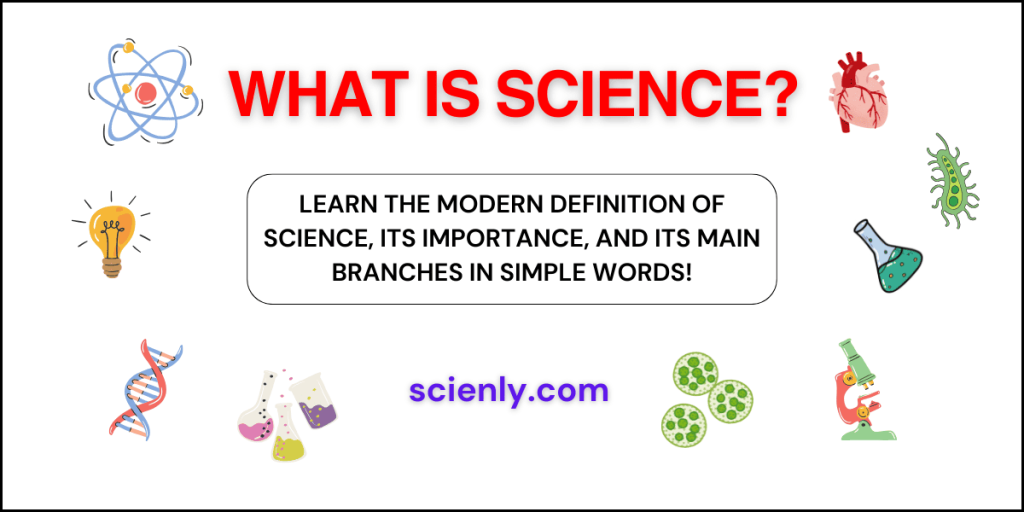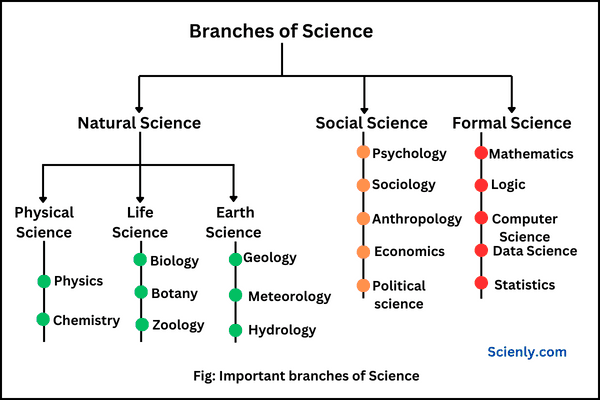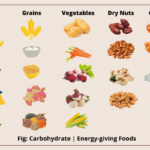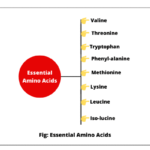What is Science: Definition, Branches, Importance
In this chapter, we will learn about what is science, its definition, importance, and various main branches. Imagine you were born about 500 years ago. There was no branch of knowledge at that time. The study of everything was under a single title called natural philosophy. Humans are always curious to know how the universe works, how weather changes, why something happens or how something works.
In 384-322 BC, an ancient Greek philosopher, Aristotle, told that heavy bodies fall faster than light ones. Of course, he never did any experiments to test this thought. This shocking and wrong concept was taught in the universities for 2000 years. However, early Greeks made outstanding contributions in many fields, such as mathematics, literature, medicine, etc. but they misinterpreted the physical law of nature.
An ancient Greek mathematician, astronomer, and astrologer, Claudius Ptolemy told that the earth was a spherical and it was the centre of the universe. For about 1400 years, people believed this geocentric theory. Nicolaus Copernicus followed by Giordano Bruno corrected this concept.
Table of Contents
Italian philosopher Giordano Bruno was burned alive for just telling the truth loudly that the sun is the centre of our solar system and that our earth revolved around it. But still, people seriously continued the search for understanding our environment and slowly and gradually the knowledge gained increased. This curiosity and gaining of knowledge gave birth to “science”. In this tutorial, we will understand the definition of science in a simple words.

What is Simple Definition of Science?
The English word “science” originates from a Latin word “Scientia” which means “to know“. There will be no doubt in saying that “science” is another word for “knowledge”. Science is a system of gaining knowledge. In Sanskrit, the word “Vijyan” means “knowledge”.
We can define science in simple words as:
The study or knowledge gained through careful observations and experiments is called science. It is basically a systematic approach or attempt to understand about the physical world, nature and natural phenomena in as much details and depth as possible. A man makes experiments and takes observations. It uses the observation and experimentation to describe and explain about the nature and its natural phenomena. Science explores, experiments, and predicts from what we see around us. It unravels the secrets of nature.
The greatest scientist at all times, Albert Einstein, states that science is just not a collection of laws. It is the creation of the human mind with its freely invented concepts and ideas.
According to Bruce Lindsay, science is a way of describing, creating, and understanding human experience.
Importance of Science for Society
1. Curiosity and Understanding the World:
- People have always been curious to know and understand about the world around them.
- For this, science is the best approach to understand the physical world. It has led us to finding out things that we have today.
2. Everyday Comforts and Technology:
- Without science, we would not have electricity, which means no mobile phones, internet, or household appliances.
- Electronic devices like refrigerators for storing fresh food, televisions for entertainment, computers for work, etc. all exist because of science.
3. Healthcare and Medicine:
- Science has improved the well-being of people and societies through life-saving medical treatments.
- For example, the field of medicine owes its remarkable progress to scientific research. Vaccines, antibiotics, and medical imaging have revolutionized healthcare, which extended life expectancy and reduced the burden of diseases.
4. Agriculture and Food Security:
- Science has played a vital role in transforming agriculture, leading to increased crop yields and food production.
5. Technology and Connectivity:
- The combination of science and technology has led to revolutionary advancements, like smartphones, internet, and artificial intelligence (AI).
- These advancements have revolutionized communication and connectivity on a global scale.
6. Economic Growth and Industry:
- Science drives innovation in industries, leading to new products, jobs, and economic growth.
- Fields like energy, transportation, and manufacturing rely heavily on scientific progress.
7. Tackling Global Challenges:
- Science plays a crucial role in tackling global challenges, such as climate change, pandemics, and resource scarcity.
- Renewable energy, clean technologies, and medical research are helping societies overcome these challenges.
8. Education and Knowledge Expansion:
- Science inherently encourages logical thinking, problem-solving, and innovation.
- It expands human knowledge and inspires future generations to discover more.
9. Contribution to Society at Large:
- From space exploration to biotechnology, science continues to push the boundaries of human achievement.
- It influences nearly every sector of society, making daily life easier, healthier, and more connected.
Today, science has influenced so many different sectors that listing them is not easy on one page. Science is very important for us because it has helped to understand the world that we live today. It helps us understand our environment and improves our lifestyle.
Main Branches of Science
There are commonly three fields or branches of modern science. They are as:
- Natural science
- Social science
- Formal science

Natural Science
The science in which we study about the natural world and its phenomena that occur within it is called natural science. This branch of science explores the nature of our physical world and the universe. The three main branches of natural science are as:
- Physical sciences
- Life sciences
- Earth sciences
Physical Sciences
The sciences which study about the non-living things are called physical sciences. There are the following branches included in the physical sciences. They are as:
Physics
The word “physics” comes from the Greek word “fusis” which means “nature”. In Sanskrit, it is called “bhautika”, which means the study of physical world. Hence, physics is the fundamental branch of science that deals with the study of nature and its laws and natural phenomena. The study of physics involves dealing with matter, energy, laws of motion, the nature and type of forces that govern the universe.
There are the following sub-branches of the physics that are as:
- Mechanics
- Electromagnetism
- Thermodynamics
- Kinetics
- Optics
- Relativity
- Nuclear physics
Chemistry
Chemistry is the sub-branch of physical sciences under natural science that deals with the scientific study of the properties and behavior of matter. This branch explores the composition, properties, and reactions of matter. It investigates the structure of atoms and molecules and how they combine to form different substances when undergo the chemical reactions. Chemistry has the following key sub-branches that are as:
- Inorganic chemistry
- Organic chemistry
- Physical chemistry
- Analytic chemistry
- Biochemistry
- Environmental chemistry
- Nuclear chemistry
Life Sciences
The branch of sciences which deals with living things are called life sciences or biological sciences. This branch mainly focuses on the study of living organisms and their interactions with their environment. There are the following sub-branches or areas included in the life sciences. They are as:
- Anatomy
- Botany
- Biology
- Zoology
- Cell biology
- Genetics
- Ecology
- Microbiology
- Biotechnology
- Neuroscience
Earth Sciences
The branch of sciences that deals with the study of earth and its processes is called earth sciences. It is also called geoscience. The main aim of earth science is to understand the earth’s origin, structure, composition, and the processes that have shaped it over billions of years. There are the following sub-branches or fields included earth sciences. They are as:
- Geology
- Meteorology
- Oceanography
- Environmental science
- Hydrology
- Geomorphology
- Glaciology
Social Science
The science in which we systematically study about the human behavior and societies is called social science. It examines the complexities of human interactions and societal structures. It studies human societies from across the earth, as well as the relationship of human beings with their social environment. The main disciplines in the social science are:
- Psychology
- Sociology
- Anthropology
- Economics
- Political science
Formal Science
The science in which we study about the formal systems, abstract structures, and logical reasoning is called formal science. It is also called deductive or abstract science. It provides the tools and frameworks for other branches of science to develop and validate their theories. This unique branch uses formal systems to yield knowledge and explore the nature of different subjects field ranging from mathematics, and logic to computer science and information technology. The most important branches of formal sciences are as follows:
- Mathematics
- Logic
- Computer Science
- Data Science
- Statistics
- Artificial Intelligence
- Information Technology, etc.
List of Famous Scientists and Their Inventions
A scientist is a person who explores the nature of the universe through the use of scientific methods and principles. He conducts research, makes observations, and analyzes data to develop new noesis and advance human understanding. An investigator, on the other hand, is a person who tries to develop useful devices, tools and products. A very few people have successes in both endeavors. Here, we have listed in table 20 most famous scientists and their discoveries along with the years they made these contributions.
| Scientist Name | Discoveries | Year |
|---|---|---|
| Isaac Newton | Laws of Motion | 1687 |
| Albert Einstein | Theory of Relativity, E = mc2 (Mass-energy equivalence) | 1905 |
| Marie Curie | Discovery of Polonium and Radium | 1898 |
| J.J. Thomson | Electron | 1897 |
| Ernest Rutherford | Proton | 1919 |
| John Dalton | Atom | 1808 |
| James Chadwick | Neutron | 1932 |
| Charles-Augustin de Coulomb | Coulomb | 1779 |
| Georg Simon Ohm | Ohm’s Law | 1827 |
| Michael Faraday | Electromagnetic Induction | 1831 |
| Thomas Edison | Invention of Electric Light Bulb | 1879 |
| Henri Becquerel | Radioactivity | 1896 |
| Max Planck | Quantum theory | 1900 |
| Heinrich Rudolf Hertz | Photoelectric Effect | 1905 |
| Rontgen | X-Ray | 1895 |
| Niels Bohr & Rutherford | Atomic Structure | 1913 |
| Enrico Fermi | Nuclear Reactor | 1942 |
| Charles Darwin | Theory of Evolution | 1859 |
| Galileo Galilei | Law of Pendulum and Discoveries in Astronomy | 1602 |
| Nikola Tesla | Alternating Current and Radio Waves | Late 1800s |
| Alexander Fleming | Discovery of Penicillin | 1928 |
| Rosalind Franklin | Contribution to understanding DNA structure | 1952 |
| Louis Pasteur | Pasteurization and Vaccination | 1864 |
| Alexander Graham Bell | Invention of the Telephone | 1876 |
| Dmitri Mendeleev | Periodic Table of Elements | 1869 |
| Edwin Hubble | Discovery of the Expanding Universe | 1929 |
| Benjamin Franklin | Discovery of Lightning’s Electrical Nature | 1752 |
| Johannes Kepler | Laws of Planetary Motion | Early 1600s |
| Gregor Mendel | Laws of Heredity (Mendelian Genetics) | 1865 |
Frequently Asked Questions on Science
Science is the systematic study of the natural world through observation, experiments, and analysis.
Galileo Galilei is often regarded as the “father of modern physics” and “the father of science”. However, other scientists like Aristotle and Francis Bacon have also been influential in the development of scientific thoughts.
The three main branches of science are physical science, life science, and earth science.
Science is important in our daily life because it helps us understand the natural world better and improves technology, healthcare, communication, etc.
Science is the study of natural laws through observation and experimentation, while technology is the practical application of these laws to solve daily life problems.




